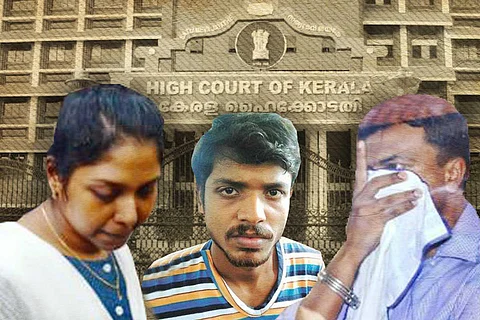

In a first, the Kerala High Court, on May 11, passed an order to conduct mitigation investigation in two murder cases, where convicts were awarded death penalty. A bench comprising justices Alexander Thomas and C Jayachandran called for a mitigation investigation in the rape and murder of Dalit student Jisha and the Attingal double murder case, to better ascertain the background and circumstances of the crime, so that nothing remains unaddressed before the court decides whether to commute or uphold the death penalties of the convicts.
In the event of capital punishment being awarded by a Sessions Court, according to Section 366(1) of the Criminal Procedure Code (CrPC), the proceedings must be submitted before the High Court, and the sentence should not be executed unless it is confirmed by the High Court. This is called the Death Sentence Reference. The Kerala HC announced the mitigation investigation while considering the Death Sentence Reference in both the above-mentioned cases.
This is the first time that the Kerala HC has directed for such an investigation. While the state argued that it is better to conduct any such proceeding after the HC hears appeals in both cases, the court held that there is no legal issue in commencing mitigation investigation before hearing begins at the appeal stage. The bench said that if investigation is conducted after the HC upholds the sentence of the lower court, it may in fact, unduly protract the legal proceeding.
In 1980, the Supreme Court in Bachan Singh vs State of Punjab, introduced the concept of the ‘rarest of rare cases’, which is considered the cornerstone of our death penalty jurisprudence. The judgement stated that death penalty can only be imposed in the “gravest cases of extreme culpability”, and that the court must pay due regard both to the crime and the criminal. “What is the relative weight to be given to the aggravating and mitigating factors,depends on the facts and circumstances of the particular case,” the court said.
Therefore, when a death penalty is pronounced by a court, there must be due investigation into the mitigating factors of the crime, i.e, the court must examine all circumstances of the crime and look at any aspects which may make the accused appear less guilty.
Advocate Mitha Sudhindran, who was one of the Amici Curiae appointed by the HC in the said cases to assist the mitigation investigation, said that a mitigation investigation seeks to enquire into whether the sentence of death penalty would be just, if the convict was substantially affected by adverse circumstances in his life, and if the crime was committed as a consequence of the failure of society to provide a healthy environment for the individual to lead a wholesome life, and if there is a scope for reformation.
“In each case where the death penalty is imposed, the mitigating and aggravating circumstances must be looked into. Aggravating circumstances would include how heinous the crime was, the age of victim, etc., among others, and mitigating factors would include the age of offender, their socio-economic background, their mental and physical stability, etc. Though this concept was laid down in the 1980 decision of the apex court in Bachan Singh v State of Punjab, there has been little consistency and reasoning in the imposition of the death penalty. This prompted the Supreme Court, in Manoj and others vs State of Madhya Pradesh, to lay down specific guidelines for a mitigation investigation. The suggested procedure of mitigation investigation and the requirement for a separate hearing on sentencing are now pending before a larger bench of the SC, and are yet to be decided upon. However, the Kerala HC is the first High Court to order that a mitigation investigation should be carried out, based on the said SC guidelines,” she added.
Advocate Mitha clarified that there is no legal bar in carrying out a mitigation investigation at the appellate stage. “While mitigation investigation should ideally be carried out during the trial stage of a case, it was not conducted in the Jisha case or the Attingal double murder case. Now, as the death sentence references are pending before the HC, the court directed the commencement of a prompt mitigation investigation without delay, so that it can aid the court in deciding upon the sentence to be imposed after hearing the appeals,” she said.
In the order passed on May 11, the Kerala HC observed that if the mitigation investigation commences only after the court hears the appeals, there would be a “serious delay”. “This will lead to the position that the convict, who was awarded death sentence by the trial court, will face a more anxious and agonising time, and for all purposes, he may experience a “Damocles' sword hanging over his head”, guessing with great tension, as to whether the death sentence awarded by the trial court will be confirmed by the High Court or would be commuted to life sentence,” the court observed.
Further, the court said that if mitigation investigation is completed even before the High Court hears the matter, it would help ease the process of the HC. “In case the conviction is affirmed, minimal time alone may be required for completing the remaining formalities of the said assessment process,” the court said.
In December last year, the court appointed Advocates Mitha Sudheendran and Sai Pooja as Amici Curiae in the case, and based on their findings, the court directed Project 39A of the National Law University (NLU), New Delhi, to conduct the mitigation investigations, stating that they were a “pioneering expert agency” in the field who have now offered to undertake the mitigation studies pro bono. An Amicus Curiae is a ‘friend of the court’, who is not party to the litigation, but studies the proceedings and submits their findings to aid the court.